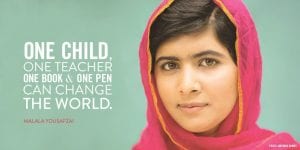This summer, I visited both the Nobel Peace Center in Oslo, Norway and the Nobel Museum in Stockholm, Sweden.
Surrounded by screens displaying pictures of past Nobel Prize winners and reading the brief descriptions of why they were chosen, I couldn’t help feel inspired. Over the last few years, I have found listening to the news especially disheartening. Yet these museums reminded me of the remarkable, positive impact that individuals can have on our world: something we don’t hear enough.
Alfred Nobel himself is quite an inspiration. By seventeen years old, he was fluent in five languages. In his lifetime he held 355 patents and established countless factories throughout the world. Nobel died in 1896. In his will, he explained his wish for his fortune to be used to honour those who demonstrate the greatest benefit to mankind in five categories: physics, chemistry, medicine, literature and peace. The annual honours were first awarded in 1901.
In 2017, the winner of the Nobel Peace Prize was the organization ICAN (International Campaign to Abolish Nuclear Weapons). Part of the exhibit which featured this winner was directed at children. The exhibit made me realize that the Nobel Prizes would be an excellent topic of learning and discussion for our students with links to the curriculum in science, social studies, language arts, health and for those of us in faith-based schools, religion class.
Upon my return home I took a look at the Nobel Prize website. The organization clearly values teachers! In their words: “Without great teachers, no new Nobel Laureates. Therefore, teachers and students are especially important to us.”
The website has lesson plans, slides and many videos available for teachers to use with their students. How might the awarding of this prize or these inspirational laureates make their way into your classroom? A few minutes of exploration on the website will likely spark an idea or two!
Today I’m giving the last word to the youngest Nobel Laureate, Malala Yousafzai, who was awarded the Nobel Peace Prize in 2014:

